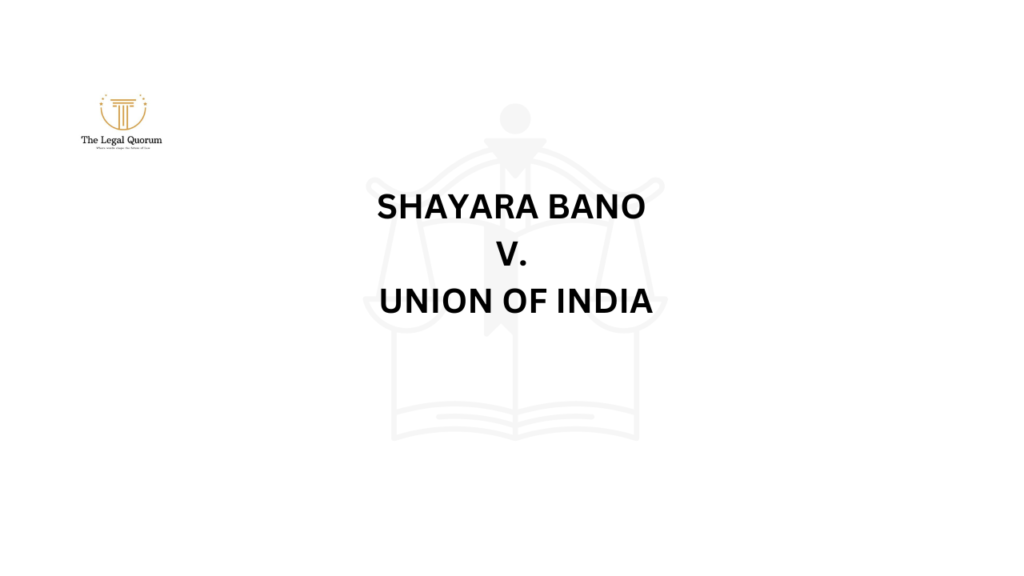Published on 15th June 2025
Authored By: Mannat
Rajiv Gandhi National University of Law, Punjab
Introduction
The Joseph Shine v. Union of India case is a landmark judgment by the Supreme Court of India that struck down Section 497 of the Indian Penal Code (IPC), which in essence legalized adultery in the nation. This decision is a significant step towards gender equity and individual freedom, opposing antiquated laws rooted in patriarchal dogma. The ruling not only revolutionized the legal interpretation of adultery but also favoured constitutional ethics over conventional societal morality.
For a long time, adultery was a criminal offense in Indian law, and Section 497 IPC penalized only men who committed consensual sex with wives. Women were treated as passive objects, immune from legal consequences, and were viewed as their husband’s property. The Supreme Court ruling in Joseph Shine disassembled such outmoded convictions, claiming that marriage is a union of equals and that individual relationships are not to be controlled by criminal law.
Background
Historical Context
Section 497 IPC was passed during the time of British colonial rule in India, reflecting Victorian morality. This section made adultery an offence but only made men criminal for having sex with married women without their husbands’ permission. Section 497 IPC made women incapable of committing adultery, further reinforcing their secondary status within marriage.
The law was based on patriarchal ideology that treated women as the property of their husbands. It entitled husbands to bring criminal charges against men who slept with them while withholding the same power from women to prosecute cheating husbands. This discriminatory legal structure persisted for more than a century despite evolutionary values and constitutional ideals.
Filing of the Petition
Joseph Shine, who is an Indian origin hotelier in Italy, filed a Public Interest Litigation (PIL) under Article 32 of the Constitution, challenging the constitutional validity of Section 497 of the Indian Penal Code (IPC) and Section 198(2) of the Criminal Procedure Code (CrPC). His petition was motivated by individual experiences, particularly the suicide of a close friend who was falsely accused of committing adultery[1].
Shine claimed that such legal provisions violated basic rights contained in Articles 14 (equality before the law), 15 (ban on discrimination), and 21 (right to life and personal liberty)[2]. He claimed that the laws perpetuated gender stereotypes, objectified women, and infringed on individual autonomy.
Legal Issues
The Supreme Court raised a number of crucial questions while hearing the case:
- Gender Discrimination
Section 497 of the IPC was discovered to be discriminatory against both genders:
It imposed punishment only upon men for adultery, exempting women from any such liability.
It depicted women as passive players, denying them agency over their own bodies.[3]
Section 198(2) of the CrPC allowed complaints only by husbands against adultery, thus denying wives the right to file cases against cheating husbands.
The Court examined if these provisions violate Articles 14 and 15 by maintaining gender inequality and consolidating patriarchal attitudes.
- Invasion of Privacy
Adultery involves consensual sex between adults, leading to questions regarding whether criminalizing such conduct invades the right of privacy. The Court looked at whether Section 497 intruded upon the privacy space of marital relationships and hence invaded Article 21.[4]
- Constitutional Morality versus Societal Morality
The Court examined whether laws founded on outmoded moral values were to be preserved within the context of constitutional principles such as equality, dignity, and autonomy[5]. It emphasized the importance of constitutional morality over popular moral standards.
- Clear Arbitrariness
The Court assessed whether Section 497 was “clearly arbitrary” under Article 14 based on its unequal treatment of men and women.
Judgment
On September 27, 2018, a five-judge Constitution Bench comprising Chief Justice Dipak Misra and Justices Rohinton Fali Nariman, A.M. Khanwilkar, D.Y. Chandrachud, and Indu Malhotra held unanimously that Section 497 IPC was unconstitutional. Some of the salient points from the judgment are:
- Declaring Section 497 IPC unconstitutional
The Court held that Section 497 violated Articles 14, 15, and 21:
Article 14: The provision was deemed to be manifestly arbitrary since it penalized men alone while exonerating women.
Article 15: The legislation was discriminatory on grounds of sex, degrading women as being inferior to men.
Article 21: Criminalization of adultery was viewed as a violation of privacy and autonomy of individuals in marriage.
Justice Chandrachud observed that Section 497 depicted marriage as a patriarchal institution, and wives as being owned by their husbands. The judgment brought to the fore that marriage must be based on respect and equality, and not based on archaic notions of domination.[6]
- Invalidating Section 198(2) of the CRPC
The Court held Section 198(2) of the CrPC to be unconstitutional since it allowed only husbands to file complaints against adultery. The decision reiterated that the said provision continued the gender bias since it disallowed wives from holding their adulterous husbands liable.
- Adultery as a Civil Offense
In decriminalizing adultery, the Court made it clear that it remains a valid ground for divorce in civil law. While adultery may still be used as a ground for the dissolution of marriage, it will no longer have criminal sanctions attached to it.
- Right to Privacy
The judgment drew on the landmark Puttaswamy v. Union of India (2017) case in support of the idea that marital life is within the purview of the right to privacy guaranteed under Article 21. The criminalization of consensual sex among adults was considered an unreasonable invasion of personal liberty.
- Constitutional Morality
The Court rejected social moral norms based on Victorian-era ideologies, stating that law must be based on constitutional values like equality, dignity, and freedom.
Impact and Significance
The Joseph Shine judgment has far-reaching implications for Indian society and its legal system:
- Encouragement of Gender Equality
By striking down Section 497 of the Indian Penal Code, the Supreme Court has eliminated traces of patriarchal values embedded in Indian law:
Women are now recognized as equal partners in marriage, not just as subordinates.
The verdict confirmed women’s authority over their own bodies and personal decisions.[7]
The judgment aligns with the world efforts that are pushing for gender justice and also shows India’s commitment to ensuring constitutional values.
- Recognition of Personal Autonomy
The judgment emphasized that personal relationships must be viewed as private matters subject to personal rights, not subject to the intrusion of the state:
Consensual sex between adults cannot be considered criminal unless it endangers public welfare.
Marriage is today seen as a partnership based on respect for each other, not on control or domination.
This enlightened perspective reinforces personal liberties in personal relationships.
- Legal Precedent
The judgment overruled previous judgments, such as Sowmithri Vishnu v. Union of India (1985), which had upheld Section 497 of the IPC on grounds of maintaining the sanctity of marriage. The Court emphasized the need for the law to evolve in line with changing societal values. This decision set a precedent for interpreting law in terms of constitutional morality rather than traditional notions of morality.
- Cultural Shift
The ruling challenges prevailing norms of society about marriage and sex. It supports a more equalistic view of the marital relationship in terms of partnership rather than dominance[8]. In asserting constitutional ideals above traditional morality, it inspires a more modernistic approach towards personal liberties.
- Decriminalization vs. Civil Liability
While decriminalization of adultery does away with state intervention in private affairs, it remains the ground for divorce under civil law. This strategy ensures responsibility within marriage while safeguarding personal autonomy[9]. Critics argue that the continuation of civil liability allows the state to intrude into personal lives continually.
Critical Analysis
The Joseph Shine ruling is widely recognized for its progressive approach to gender justice and human rights; yet, it raises serious questions about the balance between personal freedoms and social norms:
Strengths
Gender Justice: The ruling successfully tears down patriarchal legal frameworks by upholding the equality of women in the context of marriage.
Privacy Protection: It is in line with international legal norms that accord privacy the status of a fundamental right.
Constitutional Morality: Highlighting constitutional values over social mores, the judgment sets a progressive standard for future judicial decisions.[10]
Limitations
Civil Liability: Adultery remains a ground for divorce under civil law, which can create disputes related to personal conduct.
Cultural Resistance: The decision challenges deeply entrenched social assumptions regarding marriage and sex, requiring greater cultural acceptance.
Scope: While it addresses gender discrimination within the framework of adultery laws, it does not address larger issues pertaining to marital discrimination or domestic violence.
Conclusion
The Joseph Shine v. Union of India case is a turning point in Indian legal history, revolutionizing the treatment of adultery and upholding the values of gender equality and individual freedom. By repealing archaic laws rooted in patriarchal culture, the Supreme Court reaffirmed that marriage must be based on respect and not control or domination.
This landmark ruling demonstrates the need to harmonize legal systems with contemporary values while upholding fundamental rights like privacy and dignity. Even though there are still challenges in obtaining broad cultural acceptance, the Joseph Shine case sets a firm precedent for abolishing discriminatory legal frameworks and encouraging progressive values within Indian society.[11]
Finally, this case goes beyond the decriminalization of adultery; it upholds equality in marriage, recognizes individual autonomy in personal life, and gives constitutional ethics precedence over archaic social mores—a huge milestone in India’s journey toward justice and equity.
References
[1] ‘——’ (Academike, 14 August 2024) <https://www.lawctopus.com/academike/case-comment-joseph-shine-vs-union-of-india/> accessed 29 March 2025
[2] ‘Joseph Shine v Union of India’ (LawBhoomi, 20 March 2025) <https://lawbhoomi.com/joseph-shine-v-union-of-india-2/> accessed 29 March 2025
[3] ‘Joseph Shine v Union of India’ (LawBhoomi, 20 March 2025) <https://lawbhoomi.com/joseph-shine-v-union-of-india-2/> accessed 29 March 2025
[4] ‘Joseph Shine vs Union of India – Case Analysis’ (Testbook) <https://testbook.com/landmark-judgements/joseph-shine-vs-union-of-india> accessed 29 March 2025
[5] ‘——’ (Academike, 14 August 2024) <https://www.lawctopus.com/academike/case-comment-joseph-shine-vs-union-of-india/> accessed 29 March 2025
[6] ‘Joseph Shine vs Union of India – Case Analysis’ (Testbook) <https://testbook.com/landmark-judgements/joseph-shine-vs-union-of-india> accessed 29 March 2025
[7] Khan OH and Arif F, ‘Law and Sexuality: Commentary on Joseph Shine vs. Union of India and Others 2018 SC’ (Scholarship Repository) <https://repository.nls.ac.in/nlsj/vol14/iss1/16/> accessed 29 March 2025
[8] ‘Joseph Shine vs Union of India – Case Analysis’ (Testbook) <https://testbook.com/landmark-judgements/joseph-shine-vs-union-of-india> accessed 29 March 2025
[9] Khan OH and Arif F, ‘Law and Sexuality: Commentary on Joseph Shine vs. Union of India and Others 2018 SC’ (Scholarship Repository) <https://repository.nls.ac.in/nlsj/vol14/iss1/16/> accessed 29 March 2025
[10] Srivastava A, ‘Case Comment OnJoseph Shine v. Union of India “ Lawful Legal’ (Lawful Legal, 12 February 2025) <https://lawfullegal.in/case-comment-onjoseph-shine-v-union-of-india/?amp=1> accessed 29 March 2025
[11] Srivastava A, ‘Case Comment OnJoseph Shine v. Union of India ” Lawful Legal’ (Lawful Legal, 12 February 2025) <https://lawfullegal.in/case-comment-onjoseph-shine-v-union-of-india/?amp=1> accessed 29 March 2025




